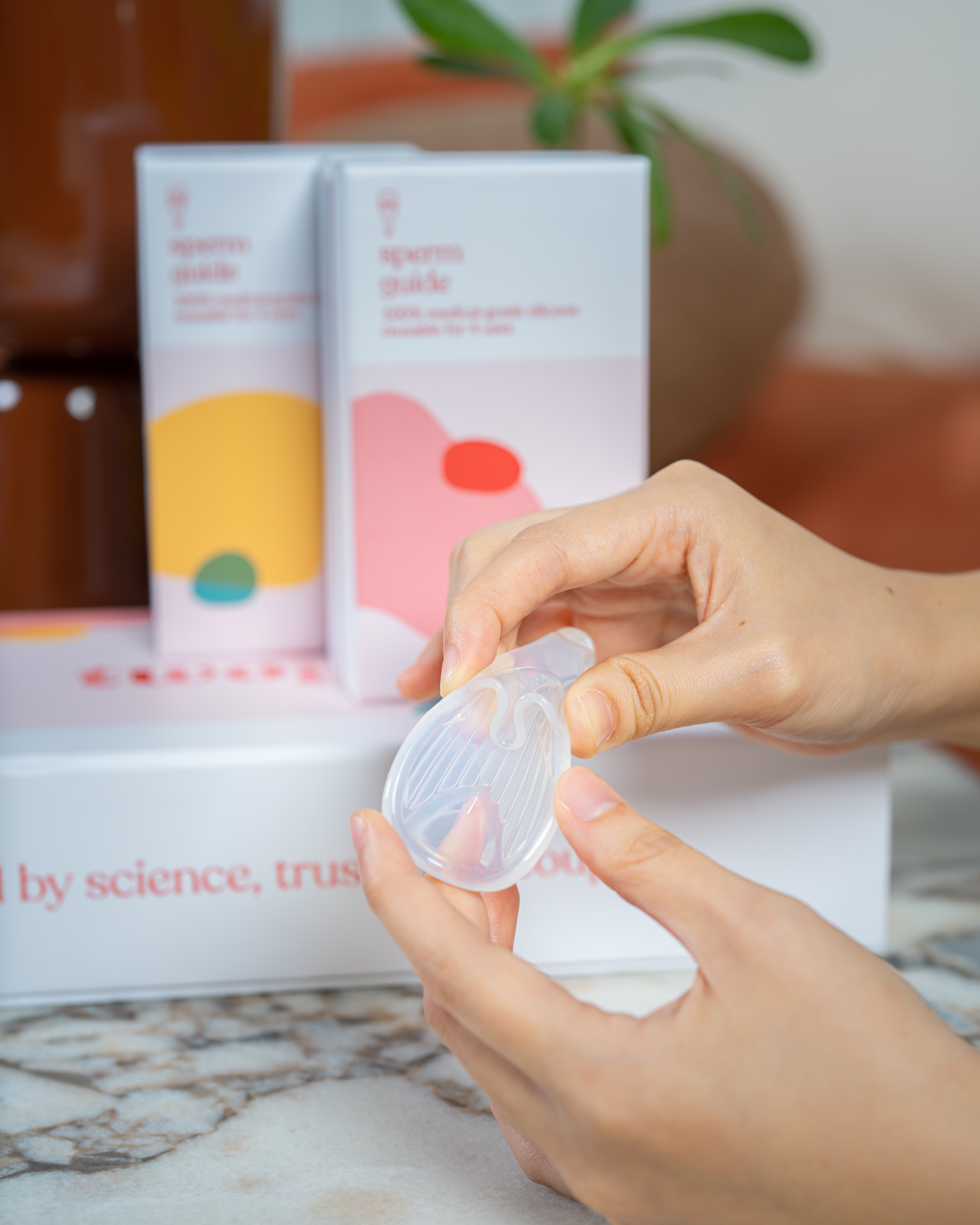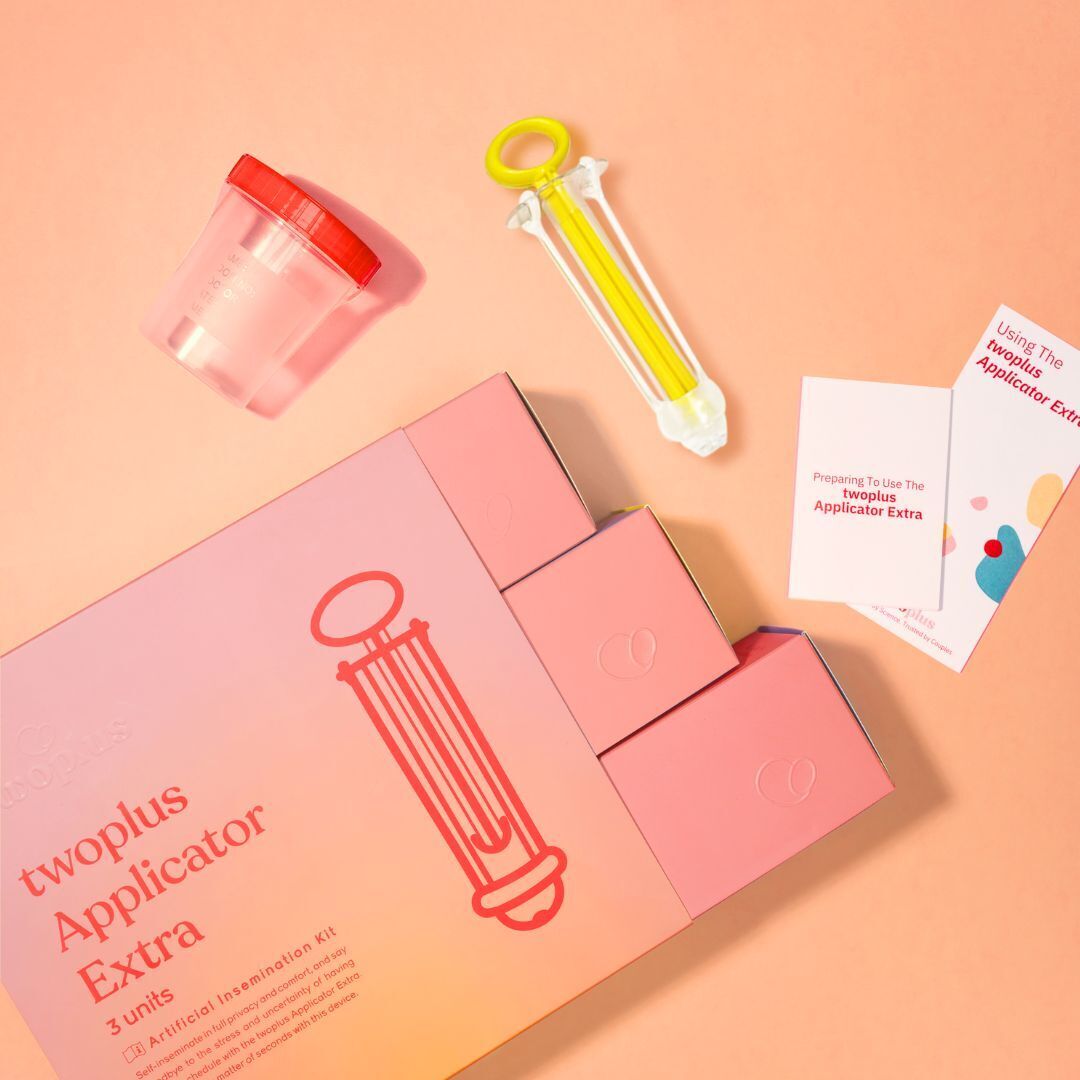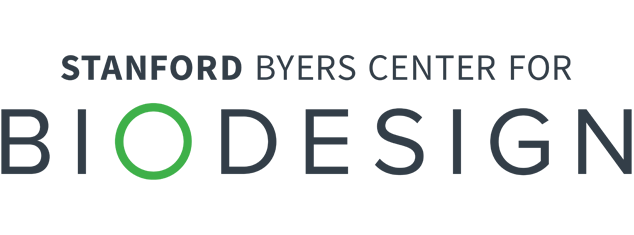Stories
twoplus: Helping Couples Tackle Infertility Issues
 The Sperm Guide is used during sex to guide sperm towards the cervical opening.
The Sperm Guide is used during sex to guide sperm towards the cervical opening.
Every entrepreneur and innovator hopes for an early sign that the hard work and late nights are worth it; that their innovation will provide a solution that people need.
For Prusothman Raja and Benjamin Tee, the sign came in the form of an early morning phone call, in 2020, from one of the partners at Y Combinator, the famed start-up accelerator. At the time, Raja and Tee were in the early stages of building twoplus, a company that aims to alleviate problems of infertility. “We were preparing to announce our new product at Y Combinator’s demo day. One of the partners, who had been trying to conceive a child with his significant other, was acting as a beta tester for us,” Tee said. “I remember it was very early in the morning when he called because he was in the Bay Area and we were in Singapore. He said, ‘It worked. We’re pregnant,’” Tee continued. “We were overjoyed that our beta tester got pregnant using our product.”
For Raja and Tee, this emotional call strengthened their resolve to press forward with the company, their second together as co-founders.
The first company for the two engineers began as a project when they were Singapore-Stanford Biodesign Fellows in 2014. As part of that program, Singapore-based innovators came to Stanford for six months to learn the biodesign innovation process before returning home to apply the approach to identify, invent, and implement solutions for pressing unmet health-related needs in the Asia-Pacific region. As they conducted their observations in hospitals, clinics, and care facilities in Singapore and Indonesia, Raja and Tee identified an unmet need for patients with hemorrhoids who were in considerable pain but were told surgery would not be an option until they were in later stages of their ailment.
After months of prototyping and iterating, Raja and Tee developed a disposable product that people could use at home for immediate hemorrhoid relief. They named their company Privi Medical and ran it for several years, receiving FDA clearance before selling it to another Singapore-based company, HeMo Bioengineering.
During that time, Tee and his wife were trying to conceive. They tried intrauterine insemination (IUI) and in-vitro fertilization (IVF) but felt there had to be a solution that didn’t require so many time-consuming and sometimes frustrating visits to a clinic.
“A lot of our friends in the same age group were also suffering from the same problems,” Tee recalled. But unlike his friends, Tee had experience creating over-the-counter solutions for pressing medical issues. “Pru and I felt we had the unique skill set to bring a consumer-facing, home-based solution to fertility care.”
The two men spent close to two years researching ideas – talking to clinicians and patients and analyzing the infertility space. And true to their Biodesign roots, they identified unmet needs – lots of them.
“We were surprised that there wasn't just one unmet need we identified, but numerous unmet needs,” Raja said. “Once we identified and screened those needs, we honed in on one and said, ‘Okay, this is the one for which we can create the most value within the shortest amount of time.’”
 The twoplus Applicator Extra allows for artificial insemination while still retaining the function of keeping sperm cells near the cervix.
The twoplus Applicator Extra allows for artificial insemination while still retaining the function of keeping sperm cells near the cervix.
One key insight that they uncovered through their research was central to the design of their solution. They realized that most sperm don’t make it to the cervical opening, which substantially reduces the odds of getting pregnant. Their first product, the Sperm Guide, is a soft, flexible device that's used during sex to guide sperm towards the cervical opening. They prototyped and iterated on the idea until they felt they had a solution that was effective, as well as intuitive and easy enough to use, that it could be an over-the-counter solution that works for many people.
When they took the idea to Y Combinator, one of the partners agreed to test it. The test proved a success and led to the early morning international call that Tee received.
Raja and Tee also developed a second product, named the Applicator Extra, based on another need identified through user interviews. It allows for artificial insemination while still retaining the function of keeping sperm cells near the cervix. This makes it easier for couples to use for whom procreational intercourse might be too stressful, for example, due to stress-induced erectile dysfunction. The second product was brought to market even faster than the first, as the team already had experience launching the Sperm Guide.
Both products are currently sold in Singapore and the United Kingdom. As of February 2024, the Applicator is also available in the United States. Twoplus is revenue-generating and, more importantly, baby-generating. Members of the twoplus team, now 15 people strong, say they’ve heard from numerous customers who were trying to conceive, naturally or by using IUI or IVF, who didn’t become pregnant until they tried one of the twoplus products.
Raja and Tee are grateful for every positive note they receive from their customers. Ultimately, they’re hoping that their products help bring one million babies to happy parents and families.
Disclaimer of Endorsement: All references to specific products, companies, or services, including links to external sites, are for educational purposes only and do not constitute or imply an endorsement by the Byers Center for Biodesign or Stanford University.
